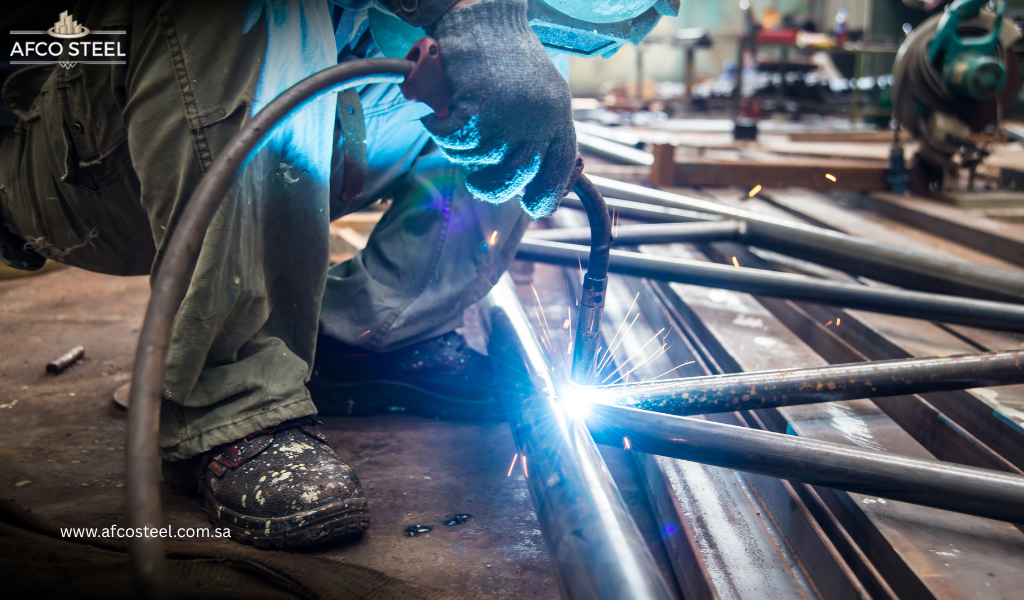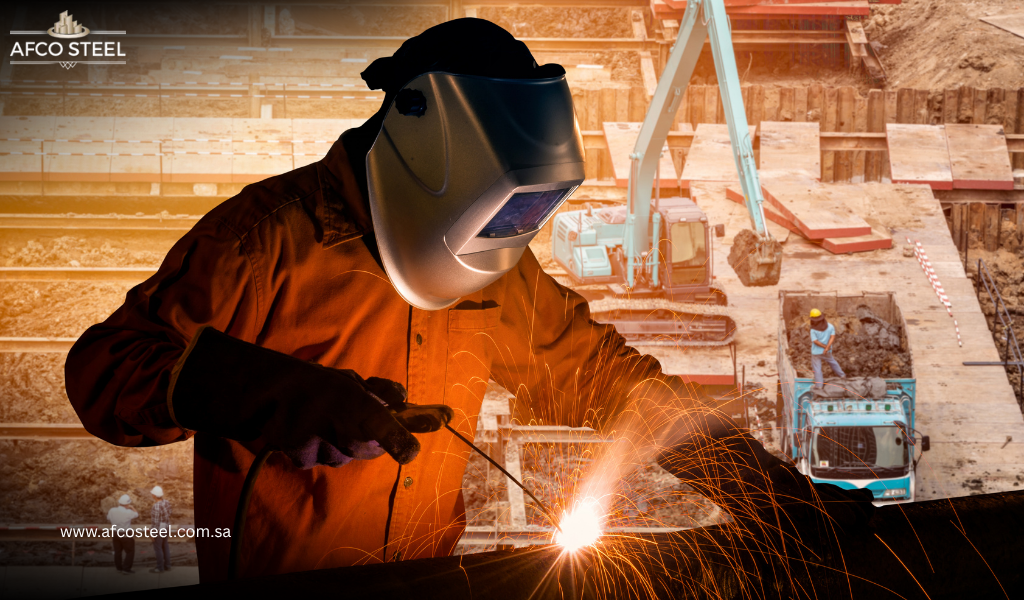Structural fabrication is the lifeblood of progress in Saudi Arabia’s fast-growing industrial sector. Modern infrastructure — From general refineries to skyscraper developments steel frameworks and custom molded structures are profitable.
With the rapid development of construction, logistics and manufacturing under Vision 2030, industrial structure fabrication is witnessing a huge demand. The precision and quality of steel structural fabrication not only define the quality of the final product, but also dictate whether a project will be strong and safe, and ultimately, how long it will last. Such totally applies in case of factories, warehouses, or commercial buildings.
Let’s explore how advanced structural fabrication is driving the Kingdom’s industrial growth — and why choosing the right fabrication partner can make all the difference.
What Is Structural Fabrication?
Structural fabrication refers to the process of creating load-bearing structures for construction and industrial applications, which includes cutting, shaping, welding, and assembling steel components. It is the engineering design, the precision machining, as well as the craftsmanship that takes raw steel and builds it into functional structures.
Unlike mass-made solutions, custom structural fabrication services enable engineers to create specific solutions suited to the exact needs of a given project — whether this is a complex assembly of beams or a heavy-duty support frame.
An expert team for steel structure fabrication ensures each weld, joint and connection conforms to international standards in terms of durability, safety and performance.
The Role of Structural Fabrication in Saudi Arabia’s Industrial Development
Steel structures are fundamental to industrial parks, logistics hubs, power plants, and mega-projects like NEOM and The Red Sea Global as Saudi Arabia experiences never-seen-before infrastructure growth.
This is how industrial structural fabrication is the fuel behind this progress:
Foundation for Mega Projects
Complex structures need a strong, precise high chassis to create a framework. The ability to trust that manufactured steel constructions will not fail is essential to the skyscrapers, bridges, and factories built upon their framework.
Faster Construction Cycles
Also, pre-fabricated use of steel components reduces on site work and shortens delivery times. Such efficiency also results in a reduction in project timelines — an invaluable benefit for industries with constrained timelines.
Durability in Harsh Environments
The extremely high temperatures and sporadic sandstorms in Saudi Arabia require buildings to be weatherproof. As far as quality steel structural fabrication is concerned, coatings, materials and joints need to withstand the effect of corrosion as well as temperature changes.
Support for Manufacturing & Logistics
Giant fabrication steel building footprint houses machinery, storage and transport operations, all part of the Kingdom’s expanding industrial zones.
Sustainability and Recyclability
Steel provides completely recyclable material which is compatible with the objectives of Saudi Vision 2030 in respect of sustainable development and green construction.
Key Steps in the Structural Fabrication Process
And going through the process with clients helps them to understand and have a better appreciation of the craftsmanship and technology involved in every project. A professional structural fabrication company works in an organized manner:
1. Design & Detailing
Specialized software programs like Tekla Structures or AutoCAD are used to generate 2D and 3D engineering blueprints. The design takes into account load factors, material strength, and site conditions.
2. Material Selection
The kind of steel — mild, stainless, or alloy — is determined by the strength and environmental requirements of the project. Custom structural fabrication services select materials with durability and performance in mind.
3. Cutting & Shaping
Laser or plasma cutting machines are then used to cut and shape steel sections to get the precise edges and dimensions.
4. Welding & Assembly
Experienced welders piece the parts in accordance with the design, and with the integrity and alignment of the base in mind.
5. Finishing & Quality Testing
Every part is sand blasted, plated, and inspected for corrosion. Before delivery, it deploys non-destructive testing (NDT) to confirm weld quality and load capacity.
Why Steel Structural Fabrication Is Ideal for Saudi Projects?
1. Strength & Stability
Steel has unrivaled tensile strength and flexibility — both of which are imperative for buildings subjected to high winds and heavy equipment loads.
2. Speed & Efficiency
Steel structures can be pre-manufactured and quick on-site installation, hence saving time and labor costs.
3. Customization
By using custom structural fabrication services every single part is custom made with a purpose of use giving it plenty of design flexibility and also precision.
4. Long-Term Durability
Steel structural fabrication is highly resistant to rust and wear while proper coatings and finishes make it even more suitable for coastal or desert use!
5. Cost-Effectiveness
While steel fabrication involves some investment on the front end, the low maintenance and durability delivers better value over the long haul.
Also read: How Modern Metal Fabrication Powers Vision 2030 Infrastructure Projects?
Choosing the Right Partner for Structural Fabrication Near You
Finding the right partner who can take care of your structural fabrication near me is the first and most important step to ensure that you get quality results. When measuring an organization specializing in structural fabrication, take into account:
- Experience & Certifications: You should only work with a company that follows international standards, such as ISO, AWS, SASO,θ etc.
- Advanced Equipment: Possessing CNC, laser-cutting, robotic welding tools for precision.
- Material Quality: Raw materials that are certified for compliance & strength of structure
- In-House Design Team: Having in-house design and manufacturing capabilities lead to a cohesive process.
- After-Sales Support: Frequent inspection and maintenance enhance longevity of the structure.
AFCO Steel, for example, draws on over ten years of industrial structural fabrication experience, providing end-to-end solutions, from design to erection, throughout Saudi Arabia.
How Industrial Structural Fabrication Supports Multiple Sectors?
So here are the importance of structural fabrication in few of the Saudi industries:
- Oil & Gas: Braced steel to support pipelines, processing plants, and refineries.
- Energy & Power: Reliable and robust steel structures are required for substations, towers, and turbine frameworks.
- Construction: custom-made frames for warehouses, offices and skyscrapers.
- Manufacturing: Industrial structural fabrication is needed for heavy-duty supports, conveyors, and machinery bases
- Transportation & Logistics: High-tensile steel components form ports, hangars, and storage facilities.
In every sector, successful performance, safety, and sustainability goals are contingent upon correct engineering and strong fabrication.
Quality Assurance in Structural Fabrication
It is crucial that through all stages of fabrication, quality remains consistent and uncompromised. Steel structural fabrication companies of repute practice:
- Traceability of Material — Following up on each batch of steel to show its compliance.
- Dimensional Inspections – Verification of cutting accuracy and welding alignment.
- Welding Certifications – Welders that meet the AWS or EN standards
- Non-Destructive Testing (NDT) – Assessing internal discontinuities in welds or joint
- Coating & Corrosion tests – Ensuring durability in high-temperature or coastal environments.
However these practices ensure that each of the manufactured products always meet the industry standards related to strength and reliability.

Structural Fabrication vs. Erection: What’s the Difference?
Structural fabrication deals with processing steel components, and erection is all about putting these pieces on a job site. Fabrication takes place in a controlled factory environment to ensure accuracy, and erection is when these elements are lifted, aligned, and joined in position during the building process.
Safety, stability, and efficiency are principles that both stages have to work together for, something an experienced structural fabrication company such as AFCO Steel are able to do seamlessly.
The Future of Structural Fabrication in Saudi Arabia
With the ongoing industrial transformation in Saudi Arabia, structural fabrication is being reshaped by automated practices involving robotics and digital modeling. Such innovations offer improvements to efficiency, precision and material reduction and waste.
As Vision 2030 aims for economic diversification away from oil, the demand for made-to-measure fabrication services will grow — paving the way for the smarter, greener steel construction
Conclusion
From petrochemical plants to logistics hubs, every industrial landmark in Saudi Arabia stands on the strength of Structural Fabrication. When executed with precision and expertise, it ensures not just durability but also innovation and sustainability.
Partnering with a professional steel structural fabrication expert like AFCO Steel guarantees your projects meet the highest standards of quality, safety, and performance — helping you build for the future with confidence.
FAQs on Structural Fabrication
1. What is structural fabrication and how is it done?
It involves designing, cutting, welding, and assembling steel components to create strong frameworks for construction and industrial use.
2. Best structural fabrication companies in Saudi Arabia?
AFCO Steel is among the leading industrial structural fabrication companies in KSA, offering complete design, fabrication, and erection services.
3. How to ensure quality control in structural fabrication?
Use certified materials, follow AWS/SASO standards, and conduct regular inspections and non-destructive testing.
4. What are the steps in structural steel fabrication?
Designing, cutting, welding, assembly, finishing, and quality inspection are the key stages of fabrication.
5. Difference between fabrication and erection in steel structures?
Fabrication creates components in factories, while erection assembles them on-site to form the complete structure.

